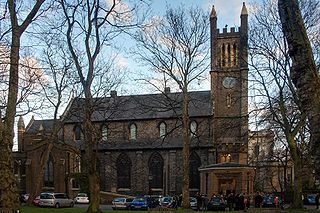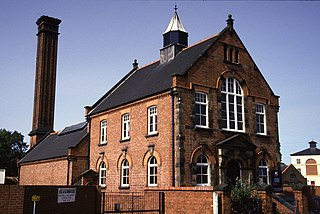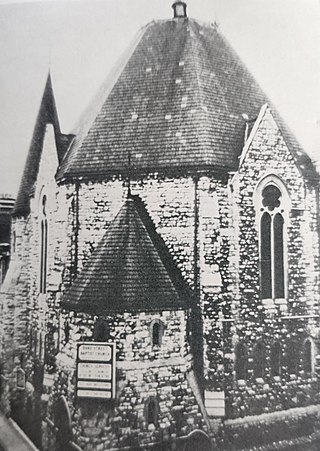The General Assembly of Unitarian and Free Christian Churches is the umbrella organisation for Unitarian, Free Christians, and other liberal religious congregations in the United Kingdom and Ireland. It was formed in 1928, with denominational roots going back to the Great Ejection of 1662. Its headquarters is Essex Hall in central London, on the site of the first avowedly Unitarian chapel in England, set up in 1774.

Oswestry is a market town, civil parish and historic railway town in Shropshire, England, close to the Welsh border. It is at the junction of the A5, A483 and A495 roads.

The Evangelical Covenant Church (ECC) is a Radical Pietistic denomination with Lutheran roots in the evangelical Christian tradition. The denomination has 129,015 members in 878 congregations and an average worship attendance of 219,000 people in the United States and Canada with ministries on five continents. Founded in 1885 in North America by Swedish immigrants, the church is now one of the most rapidly growing and multi-ethnic denominations on the continent. Historically Lutheran in theology, piety and background, it is now a broadly evangelical movement.

Headingley is a suburb of Leeds, West Yorkshire, England, approximately two miles out of the city centre, to the north west along the A660 road. Headingley is the location of the Beckett Park campus of Leeds Beckett University and Headingley Stadium.

A church service is a formalized period of Christian communal worship, often held in a church building. It often but not exclusively occurs on Sunday, or Saturday in the case of those churches practicing seventh-day Sabbatarianism. The church service is the gathering together of Christians to be taught the "Word of God" and encouraged in their faith. Technically, the "church" in "church service" refers to the gathering of the faithful rather than to the building in which it takes place. In most Christian traditions, services are presided over by clergy wherever possible. Styles of service vary greatly, from the Anglican, Eastern Orthodox, Oriental Orthodox, Presbyterian, Roman Catholic, and Lutheran traditions of liturgical worship to the evangelical Protestant style, that often combines worship with teaching for the believers, which may also have an evangelistic component appealing to the non-Christians or skeptics in the congregation. Quakers and some other groups have no formal outline to their services, but allow the worship to develop as the participants present feel moved. The majority of Christian denominations hold church services on the Lord's Day ; a number of traditions have mid-week Wednesday evening services as well. In some Christian denominations, church services are held daily, with these including those in which the canonical hours are prayed, as well as the offering of the Mass, among other forms of worship. In addition to this, many Christians attend services on holy days such as Christmas, Ash Wednesday, Good Friday, Ascension Thursday, among others depending on the Christian denomination.

Clay Cross is a town and a civil parish in the North East Derbyshire district of Derbyshire, England. It is a former industrial and mining town, about 5 miles (8.0 km) south of Chesterfield. It is directly on the A61. Surrounding settlements include North Wingfield, Tupton, Pilsley and Ashover.

Holy Trinity Brompton with St Paul's, Onslow Square and St Augustine's, South Kensington, often referred to simply as HTB, is an Anglican church in London, England. The church consists of six sites: HTB Brompton Road, HTB Onslow Square, HTB Queen's Gate, HTB Courtfield Gardens, as well as being the home of the St Paul's Theological Centre and the Alpha Course, HTB St. Francis Dalgarno Way and St Luke's Earls Court St Luke's Church Redcliffe Gardens. It is where the Alpha Course was first developed and is one of the most influential churches in the Church of England.

Newfrontiers is a neo-charismatic church network of evangelical, charismatic churches founded by Terry Virgo. It forms part of the British New Church Movement, which began in the late 1950s and 1960s combining features of Pentecostalism with British evangelicalism. Other streams of the British New Church Movement with which it shares some features include Together, Ministries Without Borders, and Life-Links. Groups like Pioneer, Ichthus Christian Fellowship, and Vineyard are more distantly related. Newfrontiers describes itself as "a group of apostolic leaders partnering together on global mission, joined by common values and beliefs, shared mission and genuine relationships". Its theology is distinctively Reformed. Newfrontiers is committed to building churches according to "New Testament principles". One of the slogans of the movement has been "changing the expression of Christianity around the world", which is based on a prophecy given to the movement in 1990 by Paul Cain, a Latter Rain revivalist.

The cell group is a form of church organization that is used in many Christian churches. Cell groups are generally intended to teach the Bible and personalize Christian fellowship. They are always used in cell churches, but also occur in parachurch organizations and other interdenominational settings, where they are usually referred to as such as Bible study groups. In Methodism, they are known as class meetings and are a means of grace; in Catholicism, they are known as basic ecclesial communities.

Inverbervie is a small town on the north-east coast of Scotland, south of Stonehaven.

Westminster Chapel is an evangelical free church in Westminster, central London. The church is in Buckingham Gate, on the corner of Castle Lane and opposite the junction with Petty France. Buckingham Gate is just off Victoria Street and near Buckingham Palace.

Coleham is a district of the town of Shrewsbury in Shropshire, England. It is located just south, over the River Severn, from Shrewsbury town centre.

Duke Street Church is an FIEC-affiliated conservative evangelical church in Duke Street, Richmond, South West London with a historical baptist tradition. Efforts from 1868 by a student pastor Frederick Brotherton Meyer started to gain traction*, and in 1869 he wrote to the Charles Spurgeon, then President of the London Baptist Association asking for his help to establish something more permanent.

Above Bar Church is an evangelical church in Southampton, affiliated to the Fellowship of Independent Evangelical Churches. The building is on the corner of Above Bar Street and Ogle Road in Southampton City Centre, with shops on the ground level and the auditorium and other rooms above them.

The Union Chapel, also known as the Union Street Chapel, Elim Free Church, Four Square Gospel Tabernacle or Elim Tabernacle of the Four Square Gospel, is a former chapel in the centre of Brighton, a constituent part of the city of Brighton and Hove, England. After three centuries of religious use by various congregations, the chapel—which had been Brighton's first Nonconformist place of worship—passed into secular use in 1988 when it was converted into a pub. It was redesigned in 1825, at the height of Brighton's Georgian building boom, by at least one of the members of the Wilds–Busby architectural partnership, Brighton's pre-eminent designers and builders of the era, but may retain some 17th-century parts. It has been listed at Grade II in view of its architectural importance.

Shrewsbury is a market town, civil parish, and the county town of Shropshire, England, on the River Severn, 150 miles (240 km) north-west of London; at the 2021 census, it had a population of 76,782. The town's name can be pronounced as either 'Shrowsbury' or 'Shroosbury', the correct pronunciation being a matter of longstanding debate.

St Andrew's Church, Oxford is an evangelical Church of England parish church in Oxford, England. It was consecrated in 1907 and is located on the southeast corner of Linton Road and Northmoor Road in the suburb of North Oxford.
Gateway Church is a Christian church based in The Gateway Centre, Acomb, York, England. Formerly known as Acomb Christian Fellowship, it is part of the ChristCentral Churches family of churches, a part of the Newfrontiers movement of churches.

St Stephen's Church is a Church of England church on Castlebar Hill in Ealing. It was founded in 1867 as a mission and is now established as a separate parish. The first church building was a temporary iron church which was then replaced in 1876 by a substantial Victorian Gothic stone building which is now Grade II listed. Subsidence made that unsafe and it was deconsecrated in 1979. It has been converted to flats but still forms the landmark centrepiece of the St Stephen's Conservation Area. The congregation now holds services on the site of the church hall which has been redeveloped as the third church building and community centre.

Crowborough Community Church is an Evangelical church in the town of Crowborough in East Sussex, England. Although it is now associated with the Newfrontiers charismatic Evangelical movement, for most of its existence it was called Christ Church and belonged to the Free Church of England, an episcopal Protestant denomination founded in the 19th century. The building, a red-brick Gothic Revival chapel with a prominent stained glass window facing the street, has stood in a central position in the town since 1879, when it was built at the expense of philanthropist Elizabeth de Lannoy. The complex includes schoolrooms and a lecture hall, part of which served as Crowborough's public library for many years.



















